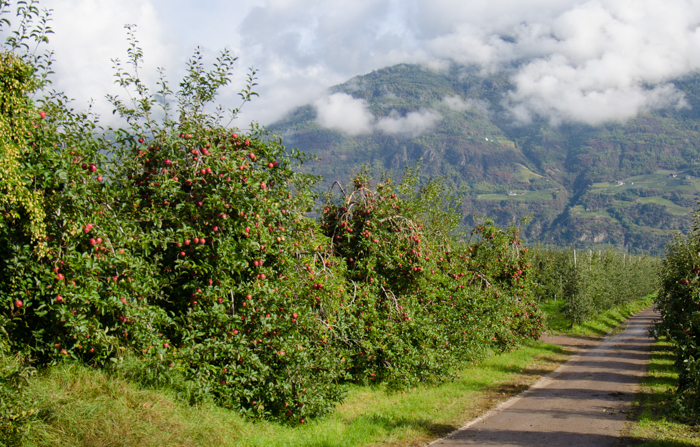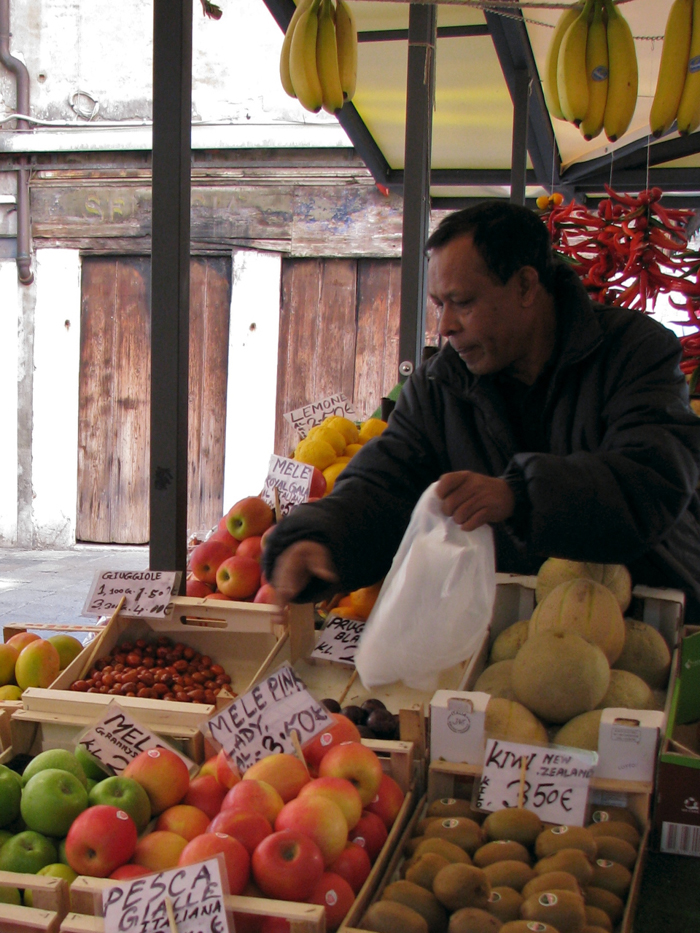Apples are grown in the regions of the Veneto, Friuli and Trentino-Alto Adige regions, but it considered to be the queen of the land in Trentino-Alto Adige. Apple orchards wind their way across Italy's north-east area, from Valsugana, continuing along the Adige Valley and then straight to the epicenter of apple cultivation, the Val di Non and Val di Sole. More than four million apples of all varieties and sizes are produced each year in these valleys and today, more than ever, they are used satisfy a growing overseas market.

The Venosta Valley in Alto Adige is the largest dry valley in the Alps, with less than 500mm of rainfall per year, with over 300 sunny days a year and cool winds at night. The altitude of the orchards extends up to 1100m and provides the apples with excellent flavor, thanks to the long ripening times. There are 2000 local farming families who work in the apple orchards and produce more than 200,000 tons of apples every year. We enjoy cycling through miles of orchards on our bike tours to this lovely area.
As of September, 2014, the apple fields surrounding the town of Malles, a stop on our Bike the Wine Road of Trentino-Alto Adige tour, will soon be completely pesticide-free. This village of 5000 inhabitants has become the forerunner of organic farming in this part of Italy. The residents could no longer tolerate seeing pesticides spread season after season around their houses, gardens and fields. These scenic narrow valleys concentrate the run-off, with the end result that most pesticides end up in the neighborhoods rather than on the apple trees themselves. Local residents feared a high concentration of toxic poisons in their food and water. In September 2014 the local municipality ran a public referendum – resulting in 75% of voters choosing to ban all pesticides from the entire village area
Italy is the world’s sixth largest producer, and Europe’s second, with 2.2 million tons of apples. Golden Delicious is the second cultivated apple variety globally and the first in Trentino where around ten thousand hectares are dedicated to apple production.Trentino is particularly well-suited to the growing of high-quality fruit, and production totals for 2009 were around 450 thousand tons, accounting for 21 per cent of the national market. One in five apples eaten in Italy comes from Trentino, and together with Alto Adige, it provides over 60% of apple production in Italy.
Due to the importance that apple production has had in the history of Trentino, today the Val di Non is the most populated valley in the province, with 38,000 inhabitants spread out in 38 communities. The elevation ranges from 400 to 1,200 meters above sea level. Most of Trentino's 300 million kilo apple production comes from the Val di Non. Varieties include the Golden Delicious and famous Renetta Canada.
The Non Valley apples are distributed today under the well-known Melinda brand. Loosely formed grower cooperatives in the area date back over 100 years, but at the end of the 1980s a more formal cooperative developed in response to the very large quantities of apples that were then being marketed under the “Val di Non” name, at least three times the amount of apples that were actually being produced in that area.

In 1989, 16 cooperatives producing apples in the Val di Non and Val di Sole valleys established the Melinda Consortium. The partner cooperatives are made up of varying numbers of member producers, totaling about 5,200 orchard fruit growers in total. The Consortium partners apply a “Product specification for integrated fruit production”, which sets guidelines for quality apple production, including controls and compliance verification. The production controls are increasingly focused on natural and organic cultivation, to insure sustainability and eliminate the deleterious effects that continued use of harmful chemicals and damaging processes can have on the local environment. As a result of the work of this consortium, the apples of the Val di Non were awarded their own DOP label, in recognition of their consistent high quality.
There are 13 different varieties of apples produced by the Val di Non Melinda Consortium. This include many familiar varieties to us in the US, including Golden Delicious, Red Delicious, Gala, Fuji, Jonagold, Granny Smith, and Braeburn, as well as a few less familiar styles, such as Renetta Canada, Morgenduft, Pinora, Gloster, Bella di Boskoop, and Stayman.
Apples appear in the local cuisine of Trentino and Friuli-Venezia Giulia in a variety of ways, most commonly in the local desserts and cakes, such as the very common apple strudel. You will also see it in savory dishes, often paired with pork.


